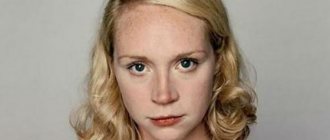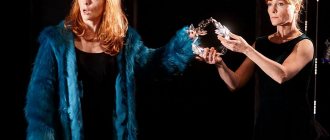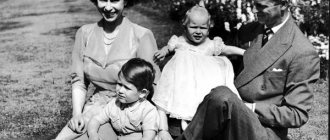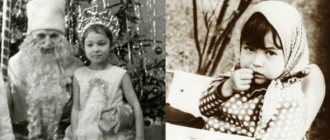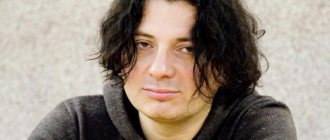Biography of Anna Melikyan
Anna Gagikovna Melikyan is one of the best female directors of Russian cinema, screenwriter and producer.
Her films have repeatedly won awards at Russian and international film festivals, and the authoritative American show business magazine Variety included her name in the top 10 most promising directors in the world. The successful filmmaker, who claims that any cinema is a search for answers that can never be found, has more than 40 works in her creative collection. Among them are the resonant and successful films “Mars”, “Fly”, “Mermaid”, “Star”, “About Love”.
Critics call her the director of a new wave of Russian cinema, each of whose works is filled with bright shots, ironic but warm humor, captivating with close attention to detail, careful study of each episode and character.
In the photo: Anna Melikyan
Childhood and family
Anna Melikyan was born on February 8, 1976 in the Azerbaijani capital, Baku.
In their family, no one had anything to do with creativity - mother Eleanor was a school physics teacher, father Gagik ran a secret weapons factory, then a carpet factory. But their daughter from an early age had an amazing imagination and desire to direct the surrounding space. She cut out invented characters from paper, played with them, and put on performances. Her talent for telling different stories in an interesting way came in handy at school. There were cases when there was no one to replace a sick teacher and she, a third-grader, was assigned to entertain even fifth-graders with her stories. Surprisingly, forty relatively adult children did not make any noise throughout the lesson and listened with pleasure to some kind of gibberish. Anya's parents divorced. She and her brother Arsen remained to live with their mother in Baku, and their father married again, and the couple had a son, Arnold, Anna’s half-brother. In the summer, children from their first marriage often stayed in a country house with their father’s new family, but as they grew older, they stopped communicating.
Later, in 1999, Gagik left his second wife and went to the USA, where he married for the third time. In 2012, he died of blood cancer, completely alone. Arnold, who was in an American prison at that time, noted in an interview that he was the only one who forgave his father and stayed by his side in difficult times. He reproached Anna and Arsen for not supporting him and not attending the funeral.
Anna Melikyan survived the Armenian-Azerbaijani conflict as a child
Due to the bloody “ethnic cleansing” that began in Baku in 1988, 12-year-old Anna moved with her family to Yerevan. Her mother is a Baku Armenian. When the Armenian-Azerbaijani conflicts began, life was very difficult for them. There was no gas, no electricity, no heat, no water, no food in the apartment. To buy half a loaf of bread, she got up at 5 o'clock in the morning and went to the queue for a special coupon.
What surprises Anna Melikyan
Interview / Hasmik Shamtsyan Photo / Anna Melikyan archive
The guest of our “Culture” column is director Anna Melikyan, whose films contain such a powerful spark of a different vision of the world that has not been seen for a very long time. Sophistication paired with simplicity, open-mindedness, wit, lightness, unusual storytelling, deep philosophy and one hundred percent recognition - all these qualities are present in both her fiction and documentary films. Her full-length films “Mars”, “Mermaid” and “Star” have already captivated hundreds of thousands of spectators and the venerable jury of international film festivals, which awarded them high prizes. “Mars” and “Rusalka” thundered in Berlin and at the American independent film festival “Sundance”, and “Star” received two prizes at the last “Kinotavr”. And before that there were short films “Let's Fly”, “Andante”, “Post Restante”, “Double Bass”, “About Love” - 1 and 2... “Post Restante” was bought by the cinema museums of Rome and Melbourne. In a word, you can find out the details of Anna Melikyan’s filmography on the Internet and partly from the following reference. Our interest is to reveal some of the personality traits of this extraordinary director, who creates on the verge of intuition and does not think at all about the success and box office of his films.
Director Anna Melikyan
Anna Melikyan was born on February 8, 1976 in Baku, grew up in Yerevan, and at the age of 17 moved to Moscow. 1995-1997. - author and director on television, author of scripts in an advertising agency, assistant to director Evgeny Ginzburg on “New Year's Lights” and various musical television show programs 1998 - director of the opening and closing ceremonies of the Moscow International Film Festival 2001 - practice in film companies in Germany invitation of the German Institute. GoetheS 2001 - member of the Union of Cinematographers of Russia 2002 - graduated from the department of feature film directing at VGIK (workshop of S. Solovyov, V. Rubinchik) 2002-2005. — director of the programs “Point of Support” (“TVC”), “Guide” (“TVS”), “Embassy Dvor” (“TVS”), “Dachniki” (“NTV”) In December 2005 she founded her own film company Magnum, which is engaged in the production of films and television series, as well as the search and production of new talents. The American magazine Variety included Anna Melikyan in the top ten most promising directors in the world.
Anna, please tell us a little about yourself.
About children's most powerful and vivid impressions, dreams and plans. Why did you decide to become a director? I didn’t decide to become a director; it’s actually difficult to decide anything with this profession: it decides everything for you. I just somehow walked towards this in some natural way, and it turned out that there were no other options for me except directing. Since childhood, I have been staging something everywhere endlessly, and everyone said: “He will be a director,” but I didn’t really understand this, I just liked directing and performing myself. Now all that’s left to do is stage it; I prefer to be behind the scenes.
What is the most important lesson from Sergei Solovyov that you learned for yourself?
Master is very important. It's not even about the lessons, but about the scale of his personality, the influence he has on you. Soloviev had a colossal influence on me, and there are no tools for this, there is simply a person, and you are very interested in him. You are interested in everything that he likes, everything that he watches, and how he talks about it, what he thinks about everything, and you just absorb and absorb, and these are all unconscious processes that then sprout in your independent works. There are so many lessons, I wouldn’t single out the main and non-main ones, because everything is important. Sergei Aleksandrovich usually came to shows and before the curtain opened, he always said: “Well, what will you surprise with?” And I still, when I get ready to do something, think: “Well, what will I surprise with there?” ?“ Because the main thing is not to be bored.
It is believed that without a wise mentor, a young female director cannot survive in the world of cinema. How did you grow up? Who became your mentor?
Well, what does a young woman or a man have to do with it? In this story, it’s generally difficult for one, the people who surround you are very important, who you listen to, who can give advice, who you communicate with during this period, because all this ultimately affects you, and therefore, What are you doing. Therefore, in different periods it is always different: masters, films, loves, joys and sufferings, literature, music, weather and quality of food - everything influences the young woman director.
Which female directors would you highlight? For what?
Well, I really don’t like it when they ask me to list someone, well, it seems to me that they are all heroines, all these female directors who have shot at least something worthwhile - they are just the real heroines, because it’s still very difficult Job.
How do you feel about your films after they're finished? Losing interest? Do you think anything could have been done differently? Do you like it? Do you forget?
I never watch my films, usually the last time I see my film is when the sound is combined with the picture and the first copy is printed, and you have to come and see everything on the big screen, check everything. I do this and never watch it again - neither at the premiere, nor at festivals, I simply cannot watch, although I am very interested in how the audience watches, and then I ask them to tell me how the audience watched, but I myself cannot be there. And I haven’t seen my old films since then and I have no idea how they look today.
Do you write scripts yourself because there are no good stories? Where do you get such exciting stories?
I write myself because I can’t find something that would pique my interest enough to devote several years of my life to it. Lately, I always involve co-authors, because it’s still easier to create a script in dialogue.
Does it happen that the script may change during filming? Become happy or, conversely, dramatic?
Yes, cinema is a very mobile organism, at least that’s how I feel about it, and I always listen to what’s happening around me, how new people appear around the story and begin to change it. I like it, I never hold on to the text, to the thought. If something new is born along the way, I try not to miss it, to use it, although intuition, of course, does not always work, mainly due to the extreme fatigue in which you usually find yourself when making films.
“I just take pictures, sometimes completely irresponsibly... But seriously, I don’t know where anything comes from” - these are your words from one interview. Could this spontaneity be considered the secret of your success? Or what do you consider to be the key to the success of all your work?
There is no guarantee of success, because there are never any thoughts about it, I just know that I have to shoot and do everything I can to make it work. I have no secrets, I just work and always doubt the result, I even panic because it always seems to me that everything is very bad and this time it’s definitely a complete failure...
The city, in particular Moscow, appears as an independent character in your paintings. Is that how you perceive it? What do Moscow and other megacities mean to you?
I often shoot about what I see, what surrounds me, and since I live in Moscow, my stories are all Moscow, although I really like shooting on expeditions, there the degree of concentration is always higher for both me and groups. And I love Moscow very much with all its energy and environmental horrors and the most amazing people you can meet only in this city.
Which director is your absolute authority? Why?
I never think so, and I don’t have any list, and it seems to me stupid to single out anyone, because well, they exist on Earth today - such different and talented film artists who can surprise with their stories and their vision, and so I like to be inspired by all of this.
What were your favorite films as a child and now?
I was very lucky with films as a child. On Armenian television they always showed in some pirated way all the classics of world cinema, all Fellini, Bergman, Tarkovsky, and I somehow became involved in this from childhood, thinking that this was cinema, and then at VGIK I was very surprised when we These films were shown in class, and no one but me saw them.
Has anything changed in your directing since the birth of your child?
I don’t analyze this, I only know that my cinema changes with me. If I change, then the films, of course, change.
People have always argued about women's and men's films. Is one different from the other? And in general, in your opinion, is it possible to pose the question this way?
Today, it seems to me, this line is much more blurred. Previously, I somehow immediately distinguished this, but now sometimes I’m mistaken, because something has changed in the air, women today are not quite women anymore, and men are often not men at all. And now go and deal with these films that they are making.
What stories do you think are most in demand today?
Well, how do I know what is in demand there? I generally live in my own little world and I know little about the big world and their needs too.
Few people like to admit their weaknesses, but still tell us about yours.
This is a difficult question for me, I need to think about it. I don’t even understand what weaknesses are and how to separate them from strengths.
What are your biggest fears?
At work, every day, every time I go to the site. There are a million fears, and the main fear is the fear of losing this fear, of thinking that you can already do everything and you are not afraid of anything.
Directors are generally considered to be tough and imperative in their work. What are you like on the set?
It seems to me that I am kind and soft, I need to be stricter.
What are you like in everyday life?
Strict, you need to be softer.
How do you see your future? What do you want to do?
I usually don’t dig that deep, I live for today. So far everything suits me - I live, breathe, make films, but I don’t know what will happen next, but I think I’ll fit in somehow, a person adapts to everything.
In case of copying and posting materials, the link to the magazine and website www.designdeluxe.am must be active and mandatory.
N46/2017
Today the Saryan string quartet confidently declares itself, albeit not very loudly yet, but quite confidently.
N46/2017
Interview with musician and dool maker, Efo Khachatryan.
An exhibition of Vagharshak Elibekyan is open at the Aesthetic Center.
Education
People around her told Anya more than once that she would definitely become a director. But in the last year of her studies, all schools switched to the Armenian language, and she decided that she would not be able to write scripts or study in theater in Armenian, because their family was Russian-speaking. Therefore, the girl began to intensively study English, intending to enroll in Foreign Languages. It was September, so she was late for the entrance exams to the Maurice Thorez Pedagogical Institute of Foreign Languages. But she was lucky - she saw an advertisement in the newspaper about the enrollment of students at the Institute of Television and Radio Broadcasting (GITR). In order not to waste a year waiting for the opportunity to enter the planned InLaz, the girl went to the directing department at GITR and soon realized that this was where she belonged.
Anna Melikyan was told more than once that she would definitely become a director
Then she entered the VGIK department of feature film directing (workshop of Sergei Solovyov and Valery Rubinchik), from which she graduated in 2002, worked as a director on TV, creating commercials and scripts for entertainment programs.
Anna Melikyan: “Loving and making films are two different things”
In your interviews, you said that as a child you staged one-man performances with yourself in the leading role.
Yes, I had a talent - mastery of the conversational genre, which, it seems to me, disappeared because the ability to make films came. After all, what is cinema? These are stories told using certain tools. Previously, I could hypnotize the crowd: I, a second-grader, would be taken out of class, taken to the fourth grade, placed at the blackboard, and I would tell fairy tales. It’s amazing that thirty children who didn’t know me listened attentively, no one acted like a hooligan. In high school, I was friends with a teacher of Russian language and literature, and although “The Master and Margarita” was not on the curriculum of Armenian schools, she allowed me to retell Bulgakov’s entire novel to my classmates in my own words—this lasted three lessons. By that time, I was directing all school productions, and adults said that this was my future profession.
So, admission to VGIK was a done deal?
When I was finishing school, the Soviet Union collapsed, and national languages in its former republics became state languages. My native language is Russian, I speak Armenian, but I cannot express my thoughts literary. So, I couldn’t write a script in Armenian, so I decided to enroll in the Faculty of Foreign Languages. Having set her sights on Moscow universities, she arrived in the capital in July, but it turned out that the entrance exams were already over. I saw an advertisement in the newspaper about the September enrollment in the new television institute - GITR, and there they were, the treasured words “faculty of directing.” Having come across it, I suddenly sobered up: what the hell is foreign language?! I immediately felt in the right place. Then entering VGIK was already painful, it was reminiscent of the favorite film “They shoot hunted horses, don’t they?” with a merciless marathon of competitive selection. You can get into directing through connections, by accident, or in some other way, but if this is not your profession, it takes revenge on you. I saw how many fellow students suffered, realizing that this was not their calling: out of forty who entered, four “survived” to the end. Many people entered this profession out of love for cinema, but loving it and doing it are two different things. At seventeen it was difficult to understand who you were; we saw the film for the first time at the institute. It's all simpler today. I sometimes look into my daughter’s room and see how she and her friend are making movies on their iPhone.
Your course work was the short film “We flew” with Nelly Uvarova, and the next student film, “Poste restante”, ended up in the collections of film museums in Rome and Melbourne.
Probably, I achieved the most striking success at VGIK: every month I went to festivals all over the world, I was constantly praised by teachers. Praise affects people differently; personally, I am built in such a way that I need it, it makes me want to move on. Thanks to that period of my life, today I don’t waste myself on the search for fame. After all, how does the mechanism of a big movie work? Now the film “About Love” is preparing for release, so I’m in great demand, showing off in glossy magazines, giving interviews, being photographed from morning to night. To an immature mind it may seem that that’s all, this is success, you are a star. But after the premiere the phone is silent, no one needs you. And if you don't understand that the industry works this way, you can become depressed.
One of the constant heroes of your films is Moscow.
I immediately established contact with the city. I studied at VGIK with guys from Yerevan who thought I was a Muscovite. They liked to discuss me behind my back in Armenian, being sure that I did not understand them - so they were surprised when, in my third year, I once broke down and answered them in Armenian. When I moved to Moscow, I thought that I would have a lot of complexes: I’m small, dark, and the Russians are all tall—I couldn’t even visually imagine myself being around. But here I made friends with tall, chic blondes, blossomed, opened up like a woman, felt special, loved who I am.
Creation
Already the first short films of Anna Melikyan, shot by the aspiring director during her student years, captivated connoisseurs of good cinema. In 2000, the film “Let’s Fly” received awards at the International Film Festivals in Milan and Ismailia. In 2001, the film "Poste restante" received prizes in Melbourne, Clermont-Ferrand and Poitiers. Both films were purchased by the Rome and Melbourne Film Museums.
Anna Melikyan began successfully filming already in her student years
In 2004, at the Berlin Film Festival, she presented her first full-length film: the drama “Mars” about the famous boxer performed by Gosha Kutsenko. The work was immediately awarded with two awards at the XIII Film Forum of the CIS and Baltic countries “Kinoshock”: a special diploma from the Grand Jury and a special prize from the producers.
A still from Melikyan’s debut feature – “Mars” with Gosha Kutsenko
In 2007, another creation of the talented Armenian – the film “Mermaid”, for the filming of which she founded her own cinema, received rave reviews from critics and many film awards, including prizes from festivals in Yerevan, Berlin, Sofia and Park City. Endeavor Talent Agency, which has worked with such celebrity clients as Ben Affleck, Matt Damon, and Martin Scorsese, undertook to represent her interests in the United States. Her high professionalism was also recognized by her inclusion by Variety in the list of ten, in their opinion, the most promising directors on the planet. Trailer for Anna Melikyan’s film “Mermaid” In 2008, the film was nominated from Russia for an Oscar. During the same period, the director’s high achievements in the field of cinema were awarded the national youth award “Triumph” (2.5 thousand dollars).
Anna Melikyan's works have been repeatedly recognized as the best
Her melodrama “Star,” which was released in 2014 and presented the story of completely different people who later became kindred spirits, was also warmly received by the public and appreciated by experts (victory at Kinotavr).
At the premiere of "Stars"
According to Anna, she spent a painfully long time writing the script for the film and very carefully selected actors to play each character. The strange girl Masha, who dreamed of becoming an actress, was played by Tina Dalakishvili, whom Anya saw in the film “Love with an Accent” by Rezo Gigineishvili, the image of Deputy Minister Sergei was embodied by Andrei Smolyakov, his life partner Rita by Severiy Janusauskaite, Sergei’s son Kostya by Pavel Tabakov, Jr. son of Oleg Tabakov. "Star" (2014) | Trailer for the film by Anna Melikyan It is interesting that all the accessories of the characters in the film, from the Birkin bag to the diamond jewelry, were genuine.
Successful film director Anna Melikyan
A year later, a new film “About Love” was released in Russia. It tells “physiologically, ironically and philosophically” five stories about sex and romantic relationships, united by the monologues of the heroine Renata Litvinova. “About Love” (director Anna Melikyan) | Trailer The film was recognized as the best film work by both major domestic festivals - Golden Eagle and Kinotavr. The main roles in it were played by many Russian movie stars of the first magnitude: Ravshana Kurkova, Mikhail Efremov, Vladimir Mashkov, Yulia Snigir, Evgeny Tsyganov. By the way, the director called her favorite scene in this film the half-drunk conversation between the wife (Sasha Bortich) and the mistress (Maria Danilyuk) of Tsyganov’s character, when they, lying in bed, chatted about something of their own, and Zhenya listened and listened and fell asleep.
On the set of the film “About Love”
In addition to directing, Melikyan was involved in film production. For example, the films “I Believe or Don’t Believe”, “Crisis of a Tender Age”, “Son of Wolverine”, “The Diary of Louise Lozhkina”.
Personal life of Anna Melikyan
A successful film director tries not to let the public know about his private life. It is known that she was married to producer Ruben Dishdishyan. The married couple had a daughter, Alexandra. Anna does not comment on the circumstances of the separation from her husband.
Anna Melikyan with Ruben Dishdishyan
For several years she worked on her husband’s grandfather’s memoirs about the Genocide, which struck her with the depth and relevance, which she published as the book “Down the Euphrates on Rafts,” timed to coincide with her husband’s birthday.
Anna Melikyan with Danila Khachaturov
In 2020, rumors appeared about her relationship with Danila Khachaturov, president and co-owner of Rosgosstrakh Group of Companies. The lovers first appeared together at the premiere of the film “About Love,” which, as it turned out, he sponsored. After the evening, where they celebrated the success of the film with friends, the oligarch and the director left together, or rather, he carried her to the car in his arms.
Personal life
Anna does not like to talk about her personal life. It is known that she is raising her daughter Sasha alone, who was born in a marriage with Ani’s ex-husband Ruben Dishdishyan. The girl did not live with him for long. Today the director shares that her ex-husband has a very difficult character, which he carefully hid before marriage.
Anna Melikyan's films are not the only thing she lives with today. In her everyday life, everything is exactly like that of many ordinary women. She wakes up early to prepare breakfast for Alexandra. Then he cleans himself up and takes his daughter to school. Then he goes to work. After which in the evening he goes to school again, then home. It is very convenient that the educational institution where Sasha studies is located next to Melikyan’s office.
After the release of the film “About Love” under the direction of Anya, rumors began to circulate that she was in a romantic relationship with Danila Khachaturov. However, Melikyan herself, as usual, ignores any questions about this.
Today, the director continues to do what he loves. Anna Melikyan’s new comedy film “The Diary of Louise Lozhkina” was recently released. The plot of the film tells about friends who are in search of a happiness pill and weight loss.
Anna Melikyan now
In 2020, Anna won the first ever competition for the prize of the mayor of the Russian capital “For creating the image of Moscow in cinema.” The film “About Love” brought her a victory and a grant worth 50 million rubles. In the autumn of the same year, a new film almanac, “About Love. For adults only,” which featured John Malkovich, Fyodor Bondarchuk, and Ingeborga Dapkunaite. This time, stories about feelings that are relevant at all times were shot by other directors, but the authorship of the idea and production remained in the competence of Anna. Anna Melikyan about the film “About Love. For adults only"
“About Love” and “Fairy”
The most famous work of Anna Melikyan is the almanac “About Love” of five parts, united by the theme of the lecture given by Renata Litvinova. It was released in 2015.
The almanac “About Love” also did not go without awards. At Kinotavr, the film won two main prizes - the Grand Prix for best picture and the film distributors' jury prize.
After that, she produced the series “The Crisis of a Tender Age,” and already in 2017 a continuation of the almanac was released, “About Love. For adults only." Many celebrities appeared in the film: Fyodor Bondarchuk, Ingeborga Dapkunaite, Gosha Kutsenko and even Hollywood star John Malkovich.

